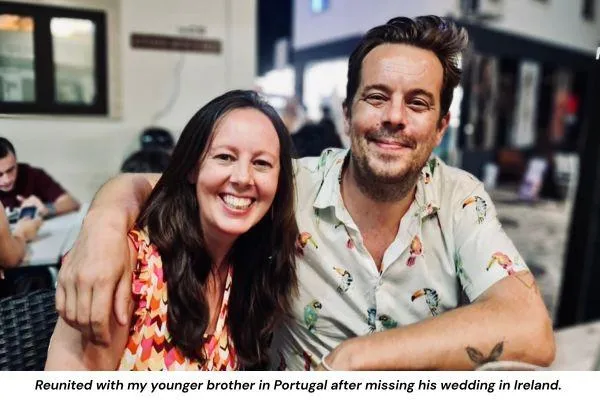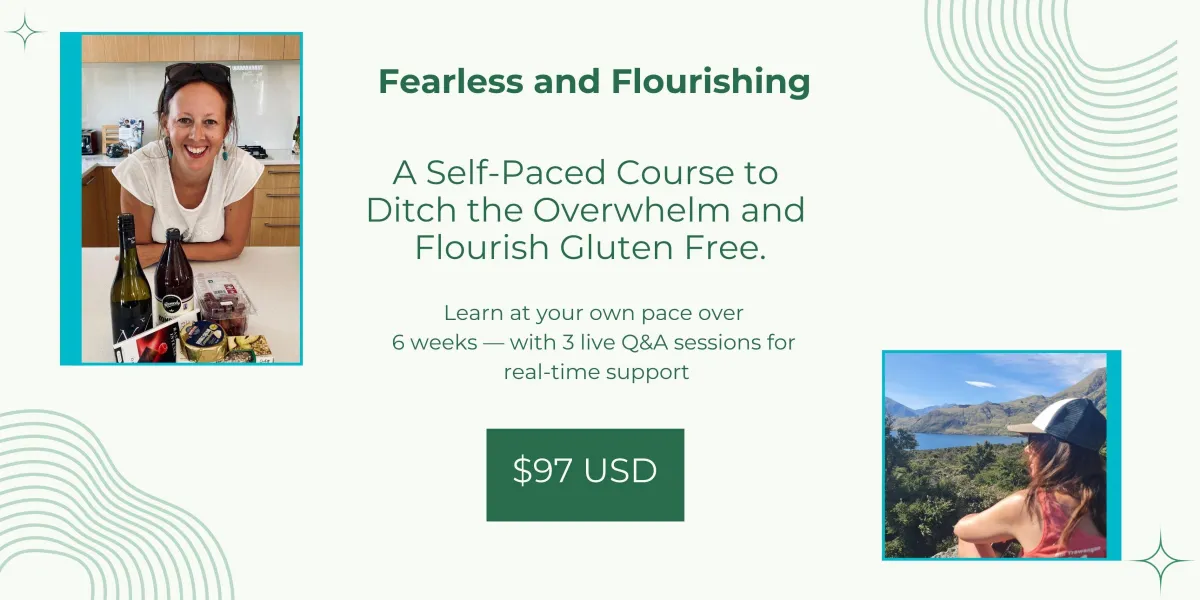Gluten Free Stories

Why a Simple Test for Low Cortisol Could Save Your Life
Why a Simple Test for Low Cortisol Could Save Your Life
By Ciara Craig
If sharing my story helps even one person feel seen, or get the right diagnosis faster, then it’s worth every word I’m about to write.
I’m Ciara, originally from the west coast of Ireland, and for the last 15 years, I’ve called New Zealand home with my husband, Darren. In October 2024, I was diagnosed with Addison’s Disease also known as primary adrenal insufficiency, a rare*, chronic autoimmune condition that attacks the adrenal glands and stops your body from producing cortisol and aldosterone (plus other hormones) that are essential for life.
It’s irreversible. And for me, it took over two and a half years to get that diagnosis.
A Bit of Background
This wasn’t my first brush with autoimmunity. I’ve been living with Coeliac Disease for over 25 years, so I’m no stranger to managing a condition that requires constant awareness, discipline, and a hefty dose of resilience. I know what it feels like when your body turns against you and how crucial it is to listen to your gut (pun intended) when something doesn’t feel right.
Like many people with one autoimmune condition, it turns out I wasn’t just dealing with one. That’s the thing about autoimmunity - it doesn’t always stop at one target.
Managing a chronic illness like Coeliac or Addison’s is often met with “but you don’t look sick”.
The truth is, invisible illnesses require visible strength, daily effort, and the right support.
The Beginning of the Crash
Let’s rewind to July 2022. Like many of us, I was emerging from the fog of Covid lockdowns in New Zealand, and I was beyond excited to be heading back to Ireland for my younger brother’s wedding. Darren and I made a stopover in Kos, Greece to visit my in-laws...and that’s where everything changed.
I caught Covid, and this was no mild version. It hit me like a freight train. Within hours: vomiting, stabbing stomach pains, nausea, dizziness. I was spiralling fast. Despite how sick I was, I pushed through, determined not to miss my brother’s big day. We somehow made it onto a flight from Kos to Dublin, via Heathrow.
By the time we landed in London, I collapsed. I lay on the floor of Heathrow Airport, unable to walk, while Darren went searching for medical help, quickly. I ended up in a high dependency unit in a London hospital for four days.
Looking back now, my specialist believes I was probably having an adrenal crisis - a life-threatening event -masked by the presence of Covid. An adrenal crisis is a medical emergency, and without cortisol, your body simply cannot cope with stress or infection.
At the time, no one spotted it.
The Mystery Years
Back in New Zealand, life didn’t return to normal. Far from it. I was in and out of doctor’s offices, having every test imaginable - endoscopy, liver screenings, blood tests on repeat. But still, no answers.
Meanwhile, I was falling apart.
I was working remotely in a fast-paced, exciting role as GM of Marketing & Events for a company in Wellington. It was a job I genuinely loved, filled with creative energy, big events, and an incredible team. I’d push through packed workdays, smile through meetings, and deliver on deadlines. But as soon as I closed the laptop or got back to my hotel room, I’d crash, completely depleted.
Weight was falling off me. My hair was falling out. My blood pressure was so low that standing up too quickly became a daily gamble. I was vomiting after work events, and the fatigue was so crushing that even some basic tasks became a challenge. Eventually, I had to walk away. Not because I wanted to, but because my body simply couldn’t keep up anymore. That was one of the hardest things to accept.
I was told I had Long Covid. Then fibromyalgia. But deep down, I knew something wasn’t right. I kept insisting there was more to the story. It’s hard being labelled with something vague with no recovery plan, when you know it’s not the full picture. And so I kept pushing. You have to advocate for yourself when your body is screaming and no one’s listening.
The Turning Point
In October 2024, my specialist admitted he was “scraping the barrel” for ideas — but there was one last test he wanted to try. A simple cortisol blood test.
Bingo.
That one test changed everything. A few follow up tests confirmed it: I had Addison’s Disease. My adrenal glands had stopped producing cortisol and all other hormones that they naturally produced to keep you alive and functioning. I was prescribed hydrocortisone immediately - synthetic steroids that now do the job my body can’t. It’s strange to realise that tiny tablets are the reason I’m still here...I’m literally kept alive by medication every single day.
It was overwhelming. But it was also a relief. After years of not knowing, I finally had a name. A plan. A way forward.
I was referred to an Endocrinologist, a specialist who diagnoses and treats diseases of the endocrine system, including hormones like cortisol. For the first time in years, I felt like I was in the right hands.
Why I’m Sharing This
I want you to know that if you’re experiencing symptoms like mine - unexplained fatigue, dizziness, vomiting, low blood pressure, weight loss - there is a test that might change everything. Cortisol deficiency is life-threatening, and yet it's often overlooked.
I’ve realised how misunderstood this condition is. We hear so much about high cortisol and stress — but low cortisol? That’s the danger zone that not many people talk about.
Now, I carry emergency steroid medication, a medical ID card, wear a medicalert bracelet when I’m out of the house, and I’ve had to educate friends and family about what to do if I have a crisis again. There’s no off switch - this is a lifelong condition.
So if you are not feeling great and have some mystery symptoms, ask your doctor for a cortisol blood test. Just to rule it out. Just in case.
Rebuilding
I’m still learning how to live with this disease.
Living with Addison’s Disease means carefully managing every ounce of energy I have and that’s where the Spoon Theory comes in. The idea is simple: every task, no matter how small, costs a “spoon” of energy. Healthy people start the day with an unlimited drawer full of spoons; those of us with chronic illnesses don’t. For me, even everyday things like getting ready, socialising, or dealing with stress — physical or emotional — all use up precious spoons. So I have to plan my days carefully: pace myself, rest when I need to, and choose where to spend my energy. It’s a delicate balance between living fully and protecting my health and it requires constant awareness, compassion, and acceptance.
But I’m no longer in survival mode. I’m rebuilding - slowly, gently, and with hope. I’m finally doing the things I’ve loved and dreamt of returning to for the past two years. Skiing again this year, and skinning up The Remarkables Ski Field, brought me to tears...but this time, they were happy ones. I know I’m getting stronger, because some days Addison’s Disease doesn’t hold me back. And then there are days when life hits me out of the blue, and I have to updose just to get through. But even on those tougher days, I’m learning to listen to my body, trust the process, and celebrate how far I’ve come.
I haven’t got here alone. Thanks to my incredible husband, who stood by me every step of the way. He carried me through some of the hardest days of my life, and I will be forever grateful. Now, we’re finally looking ahead to adventures and freedom, not just medical appointments and mystery symptoms.
As long as I’m looking after myself and taking my daily medication, I know I’m heading in the right direction. Some days, that still takes courage to trust the process, to accept the new rhythm of my life, to keep showing up. But honestly, that medication is a lifeline.
It gives me the energy to laugh, to plan, to dream again. And that feels like a small price to pay for a version of me I can finally recognise - one who’s healing and now full of hope.
Addison’s Disease is rare. But not being believed? That part isn’t. You know your body. Trust it. Fight for answers. And don’t ever stop asking until something makes sense.
And just in case you were wondering… yes, I did miss the wedding. But I’m still here — and that’s what matters most.
____________________________________________________________________
*Addison's disease affects an estimated 0.004% to 0.0144% of the global population, or approximately 320,000 to 1.15 million people worldwide. Source: Orphanet Journal of Rare Diseases; Endocrine Society




